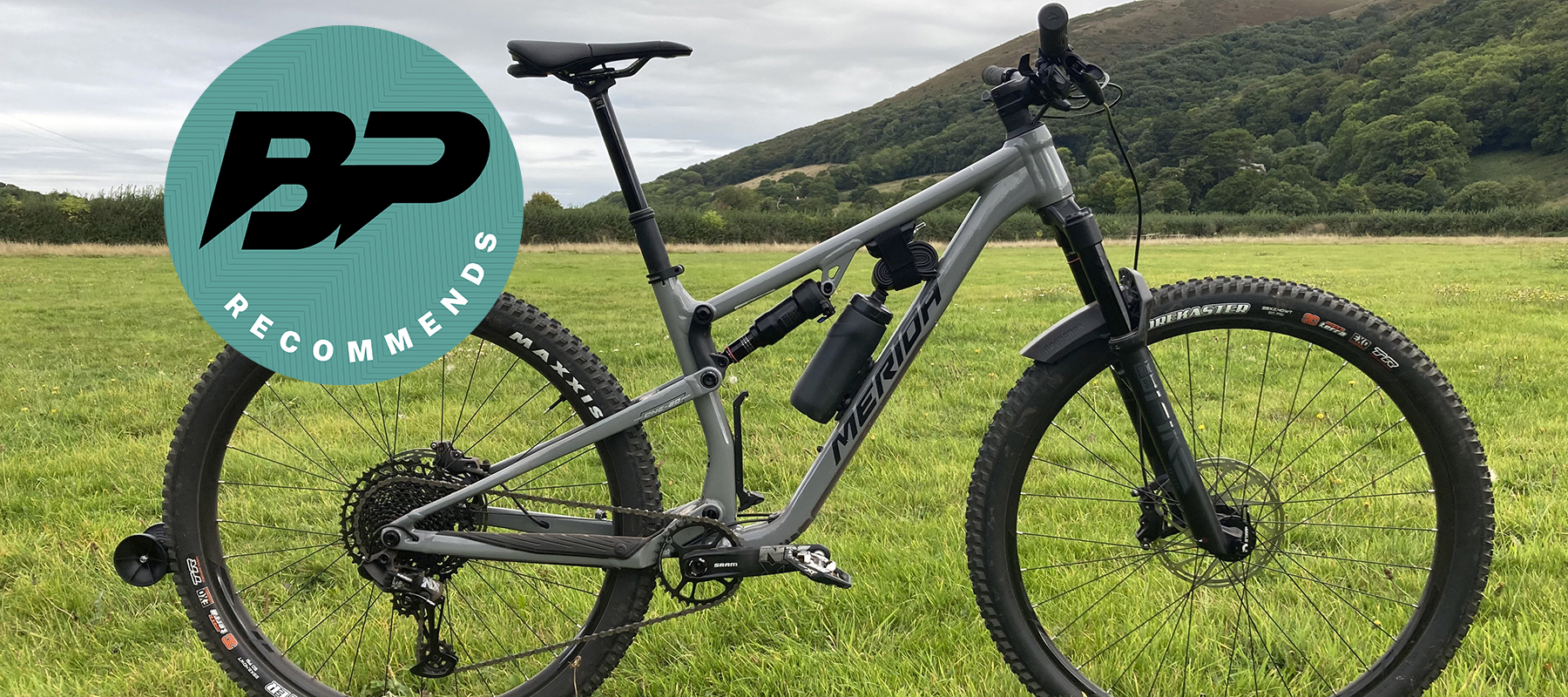Bike Perfect Verdict
The One-Twenty 700 is a pure and simple mountain bike. It’s happy to go up the hill, along the top, and down the other side. Unless you live in the presence of some serious terrain, the One-Twenty would make a great everyday bike.
Pros
- +
Competent climber and fun descender
- +
Neutral characteristics for all-around biking
- +
Hassle-free component package
- +
Lifetime frame warranty
Cons
- -
A bit heavy
- -
Maxxis Forekaster tires lack bite to push downhill limits
- -
SRAM DB8 brakes a little underwhelming
Why trust BikePerfect
Following the recent success of Merida’s longer travel One-Forty and One-Sixty trail bikes, the One-Twenty has now seen some significant changes since it was last updated in 2019. Merida’s goal with the re-incarnation of the One-Twenty was to develop an affordable do-it-all platform, providing a stable and confident ride that still maintains some playfulness. Merida is keen to point out that this isn’t an in-vogue ‘downcountry’ bike and describes it as a short travel trail bike. After spending a few days testing the One-Twenty 700 version on some very challenging terrain, I completely agree with this sentiment.
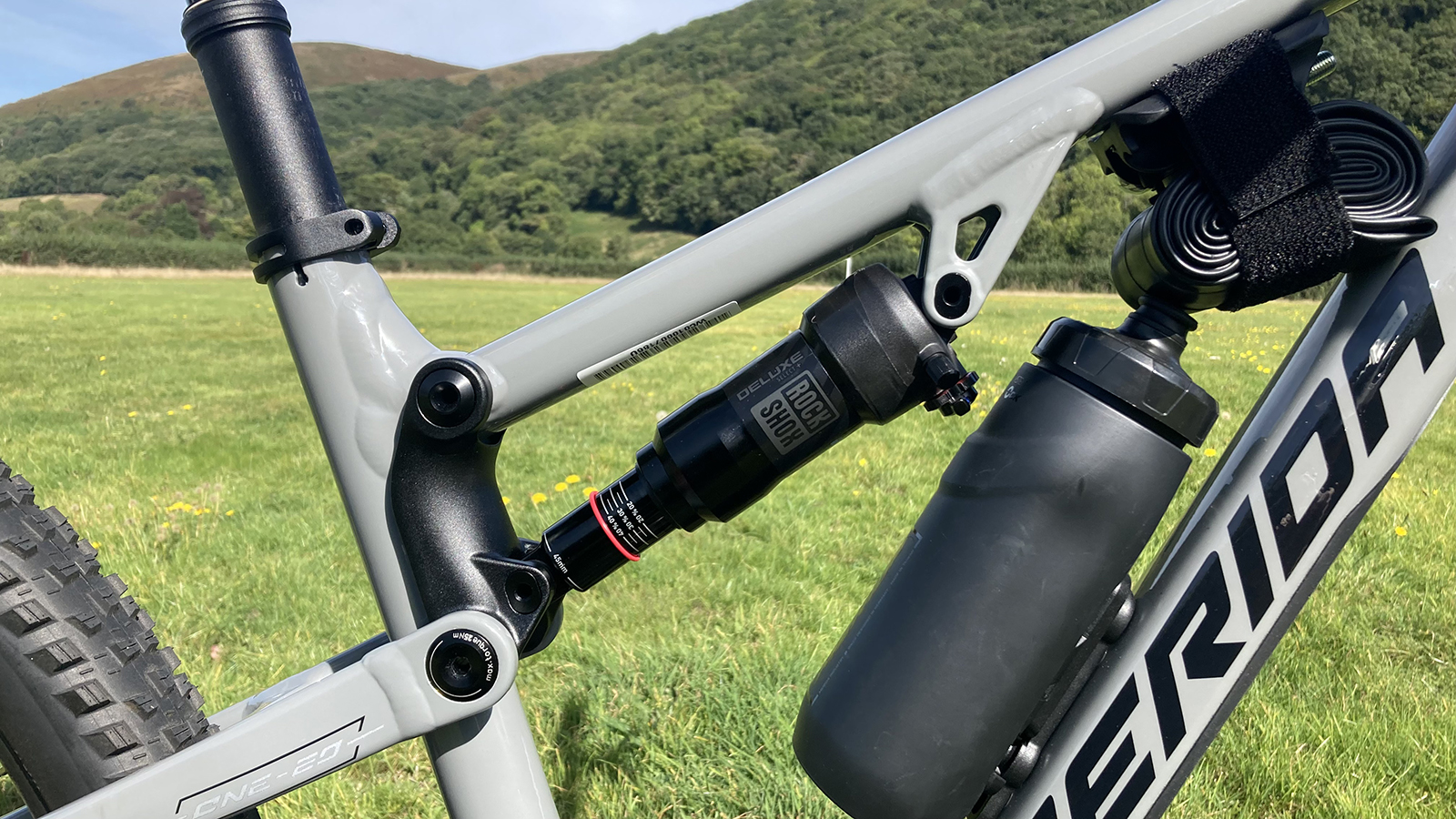
Design and geometry
The design of the One-Twenty borrows heavily from its highly-rated longer travel sibling, the One-Forty. It is only available in an aluminum format with 29” wheels front and rear. The rear shock is now horizontally mounted under the top tube, and the pivot at the rear axle is gone. The suspension design relies on flex in the aluminum seatstays, which is unusual to see on aluminum frames with linkage driven shocks
Merida calls this design its P-FLEX suspension platform and has already had success with this method on the One-Forty aluminum frame. The seatstays have been carefully butted and shaped to achieve the required flex, and Merida has developed a custom shock tune with RockShox to manage the inherent springiness of the flexing aluminum. The result is a very progressive leverage curve from sag to full travel. The frame has been extensively tested at the Zedler Institute in Germany to confirm its durability to withstand continuous flexing over time, and Merida backs up the One-Twenty frame with a lifetime warranty for the original owner.
The frame itself has been well executed with hydro-formed shaping used on the seat and downtube to create a purposeful looking package. A small strengthening gusset has been welded into the junction between the seat and top tube, where the linkage pivot has been mounted, to provide extra strength.
Instead of applying the usual longer, lower, slacker geometry tweaks, Merida has tried to carefully balance the geometry to suit the intended use of the One-Twenty as a do-it-all bike. Yes, the size medium is 30mm longer in reach than its predecessor, but at 465mm for a size Mid (aka medium) the reach isn’t crazy long. The head angle has been restrained at 66 degrees, down from 67.3 degrees on its predecessor. The seat angle is now a thoroughly modern 78.5 degrees and the chainstay length across all sizes is 435mm. Merida hopes to have achieved a balanced ride, with enough high speed stability, whilst still maintaining good agility and a poppy feel with the short chain stays and a 66-degree head angle.
For frame sizing, Merida uses what it calls an ‘Agilometer Sizing System’. Essentially, the seat tube has been kept very short on all sizes, allowing riders to pick their size based on reach. Choose a longer frame for high speed stability, or a shorter frame for increased agility.
Love it or hate it, Merida has gone with internal cable routing through the headset. The overall look is undeniably clean and uncluttered with cables entering the Acros headset below the stem. Thankfully Merida has added a small service port at the bottom of the downtube to help with cable routing, and all internal cables have been foam sleeved to prevent any unwanted rattle.
The frame is well served with mounting bosses and two bottles can be fitted in the main triangle, with the downtube offering two possible positions to accommodate different size bottles. On the underside of the top tube, in front of the shock mount, there are a further two bosses for an accessory mount.
There’s a decent sized rubber chain stay protector that extends to the inside surface of the stay and additional frame protection on the underside of the downtube to protect the paint against rock strikes.
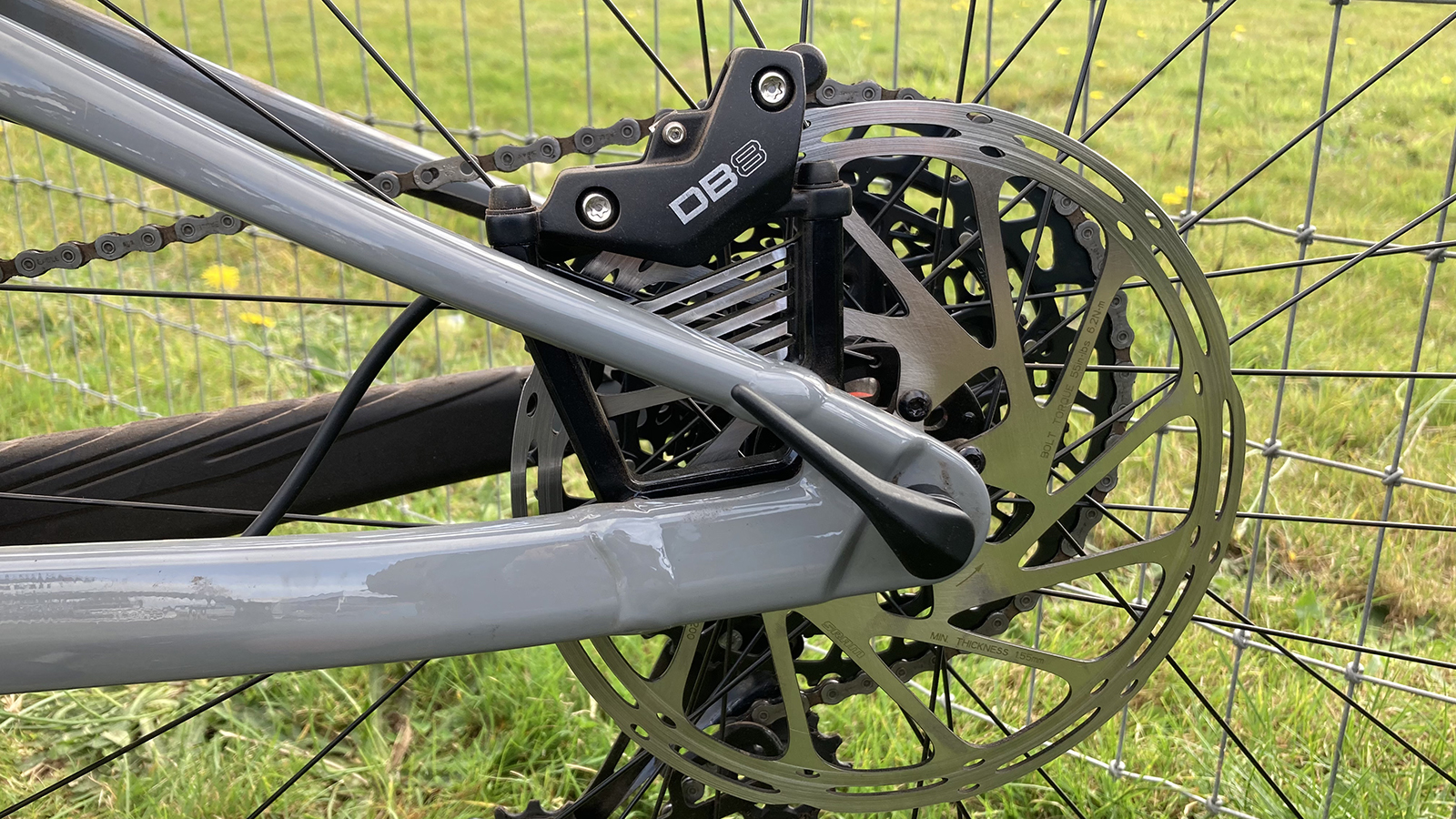
Components and build
With the intention of the One-Twenty 700 being an affordable do-it-all proposition, Merida has put together a sensible package of dependable components. Suspension is taken care of by RockShox, with a custom-tuned Deluxe Select+ at the rear and a 130mm Pike Select at the front. Gears and brakes are both SRAM, with a full NX drivetrain, including the 32-toothed DUB crank and 10-50 tooth PG1210 Eagle cassette. The brakes are 4-pot DB8 front and rear, with SRAM 200mm centerline rotors – more on these later.
The rims are Merida’s own aluminum ‘Expert TR’ which have a 29mm inner width. These are tubeless ready, but don’t come taped or with tubeless valves. The rims are laced to Novatec Team SL hubs to create a functional, if unspectacular set of hoops. The rear axle lever incorporates a 4 and 6mm Allen key for quick trail side adjustments, which is a neat feature. The tires are the excellent Maxxis Forekaster 2.4” TR EXO 3C MaxxTerra, which complement the One-Twenty’s all-round intentions.
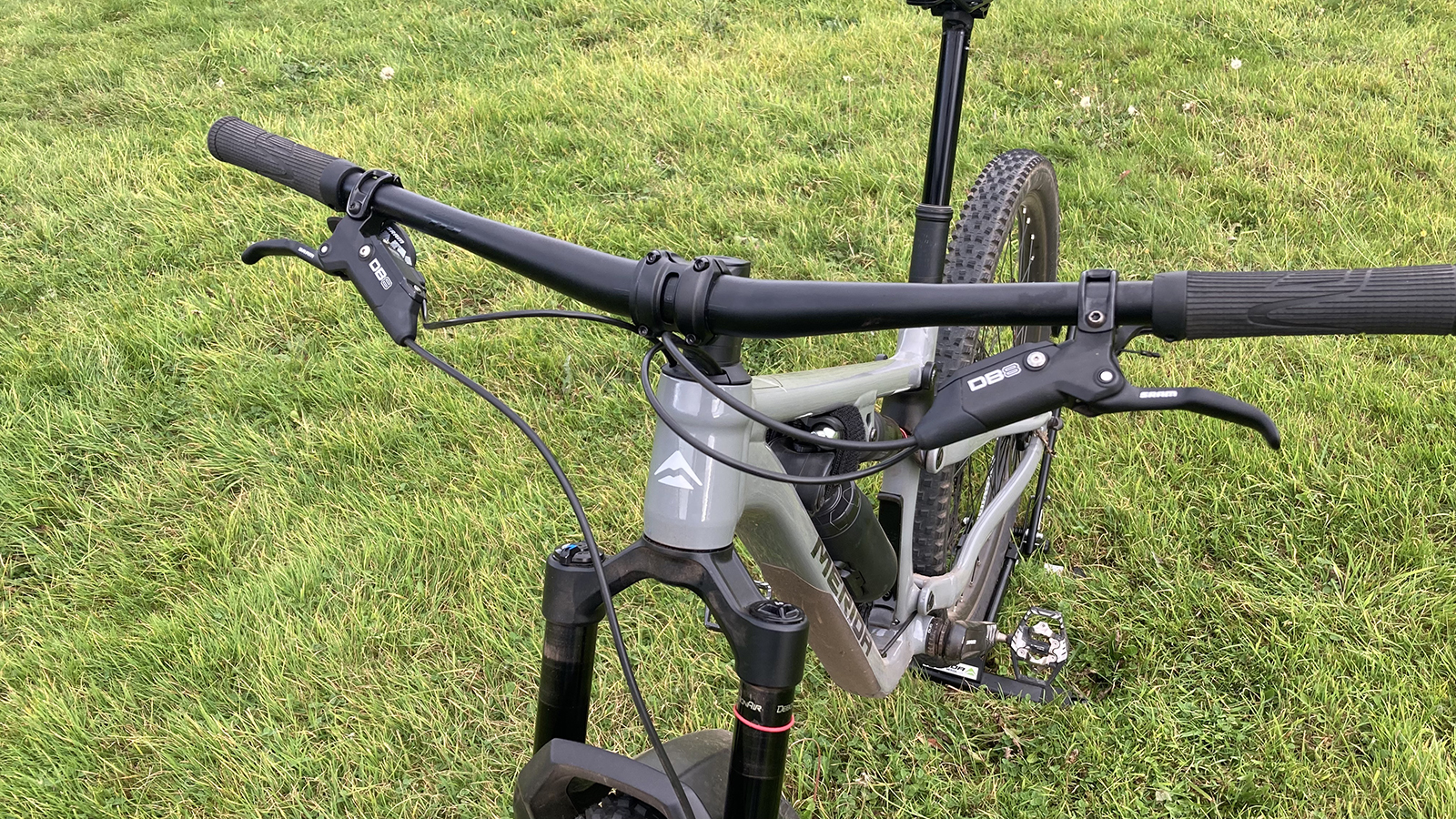
The finishing kit is all Merida in-house, with a nicely shaped 40mm stem that ties in well with the internally routed headset, matched to a 35mm diameter, 780mm aluminum handlebar with 18mm rise.
The seating arrangement is also Merida’s own, with a 150mm dropper fitted to the size XS/S, 170mm on the M and 200 on the L/XL. The saddle is Merida’s own Proxim W400 STN which is quite a stubby affair measuring only 255mm long and 153mm wide. The area of the saddle that supports your sit bones has a lot of built-in flex and I found it comfortable throughout testing. A nice feature is the integrated multi-tool that attaches to the underside of the saddle and is supplied as standard.
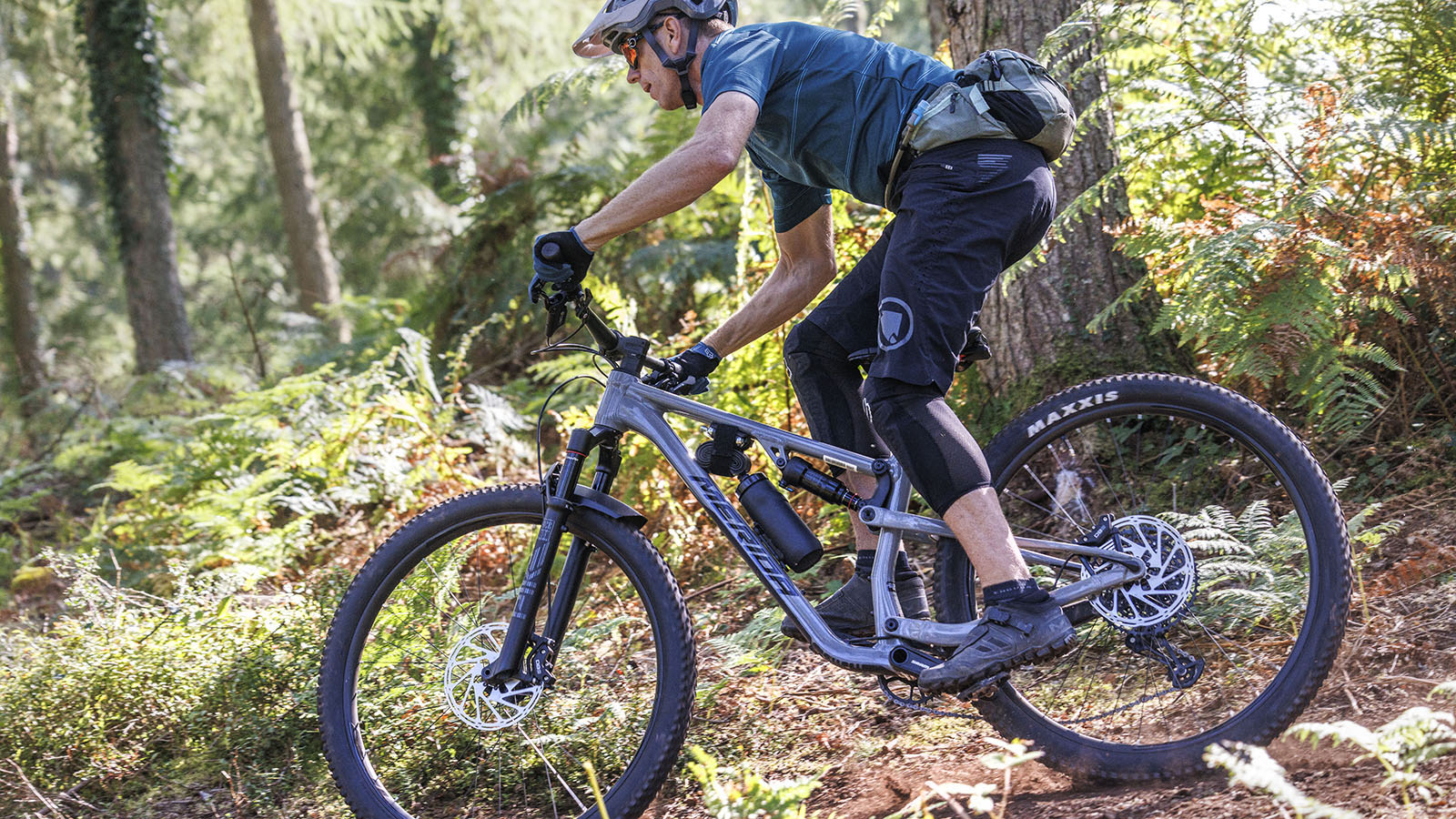
Ride, handling and performance
As I often find, at 179cm I’m bang in the middle between a size Medium and Large. I decided to go with the size Mid with its 465mm reach, as I’m not a big fan of overly long bikes for general riding. The RockShox suspension has helpful sag markings, and I set them both at 30 percent, bearing in mind the challenging Exmoor terrain I would be riding.
I felt quite at home on the One-Twenty from the start. The 78.5 degree seat angle with the 465mm reach provided a very neutral position, and I didn’t need to make many adjustments to find a comfortable fit. The launch event for the One-Twenty was based on the northern slopes of Exmoor, and included taking part in the three-day Merida-promoted EX Enduro. The fact Merida was keen for the cycling press to try the new One-Twenty at an event where most competitors would be riding enduro or long travel trail bikes is testament to the brand's confidence in the capabilities of its new short travel design.
The first day of testing was on bone dry trails, on a very hilly Exmoor, and the One-Twenty proved to be a competent climber. It isn’t a featherweight by any stretch, but the comfortable seated position proved effective on the bonkers steep climbs leading up to the fun bits on Exmoor. It’s on the descents where I think Merida has really accomplished its goal of finding an all-round balance. The reach is long enough to provide stability at higher speed, but the bike still eagerly looks for trail features to boost off and it’s easy to lift the front wheel up and over trail obstacles. I think Merida has achieved their target of a 60/40 split between descending and climbing ability. It won’t keep up with more enduro-focused bikes on fast and technical descents, but that’s really missing the point.
I soon found the grip limits of the Maxxis Forekaster tires on Exmoor’s steep and technical terrain. I can understand why Merida has specced them as they give the bike the do-it-all characteristic it was looking for. The One-Twenty felt like it had more to offer on the descents, so for the EX Enduro I asked Merida to swap out the tires for much more trail-focused Continental Kryptotals. As expected, the grip offered by the Kryptotals allowed the One-Twenty to be pushed a lot more on the descents and I could start to explore the limits of the 130mm of travel. With limited suspension travel you really need to think about your line choices on techy terrain, and it’s a great test of your skill level and nerve. I found it quite rewarding having to focus on the trail ahead instead of ploughing straight through and letting the suspension do the work. The One-Twenty was proving to be an engaging bike to ride. The downside of fitting burlier tires is the additional weight, and with the Kryptotals fitted the One-Twenty began to suffer slightly on the climbs. That’s the price to pay for additional grip and you can’t have it all!
The Pike Select fork with its 35mm chassis was happy to be thrown into corners and stiff enough to hold a good line. I found the Pike to be a little keen to get through its 130mm travel when being really pushed, but this can usually be remedied by adding tokens to ramp up the support at the end of the travel.
The SRAM NX drivetrain was faultless throughout testing, but I wasn’t a big fan of the SRAM DB8 brakes. I prefer a brake with a firmer bite point and these felt a bit spongy from the start. Despite the braking power being sufficient, I expected more from 4-pot calipers clamping onto 200mm rotors.
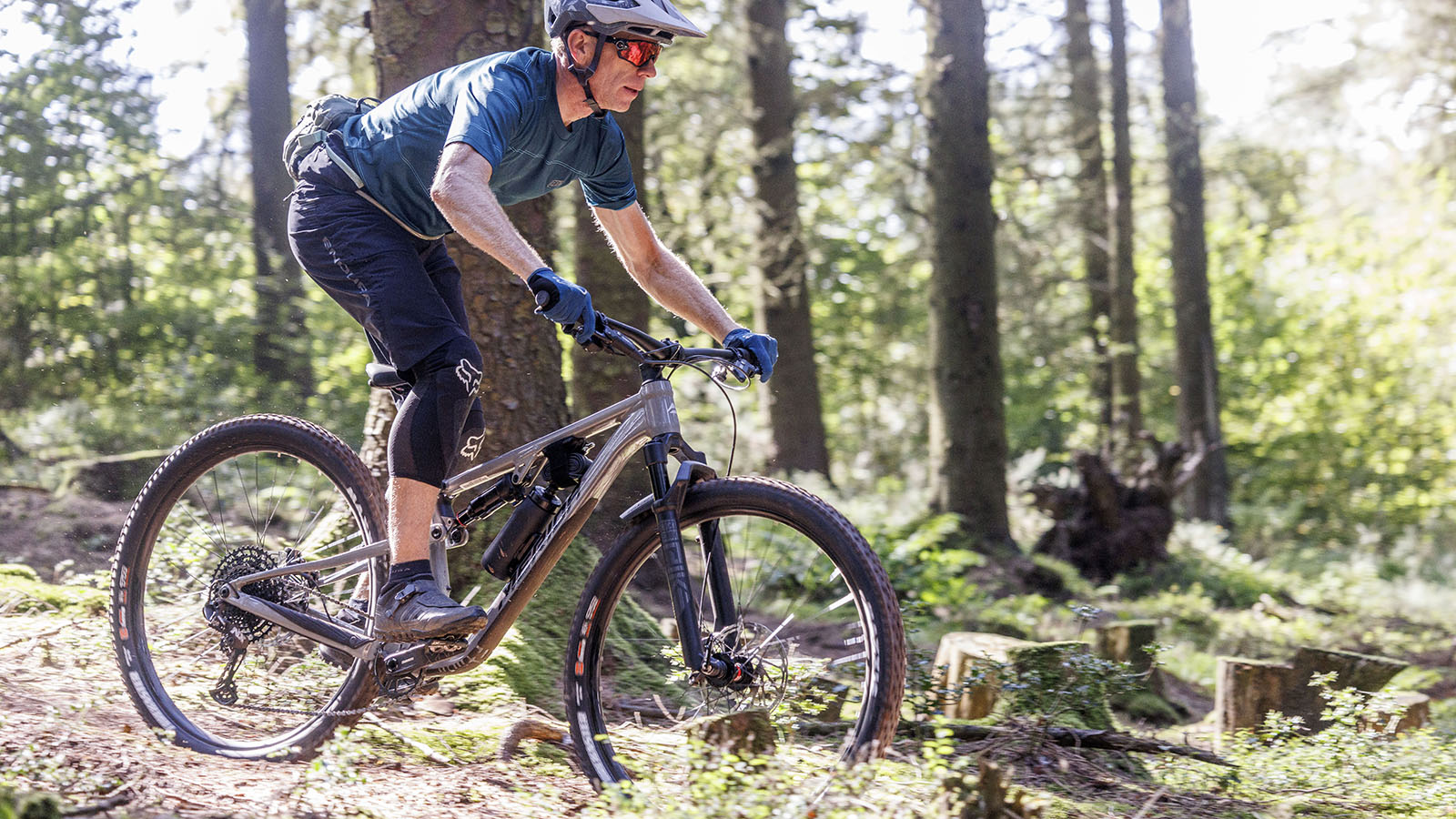
Verdict
Has Merida succeeded in making the goldilocks do-it-all bike? In a lot of aspects I think it has. The geometry is confidence-inspiring and fun to ride, it climbs well, and the component choices are well considered. The only negative is the weight, but it does a good job of hiding it on the trail and the brakes won’t be to everyone’s liking. The One-Twenty 700 would be a good choice for someone who's starting to take their mountain biking a little more seriously. Or, as an affordable, one quiver bike for a more experienced rider who doesn’t have the budget or space for multiple bikes.
I enjoyed my time on the One-Twenty and it exceeded my expectations at the EX Enduro, where it lined up with much more capable bikes. The EX Enduro is a test for any mountain bike, particularly with the foul weather conditions we experienced on the final two days. The One-Twenty proved to be a plucky little bike to ride and had a go at riding anything put in front of it. On a couple of the really challenging descents a bit more travel would have been nice and would have allowed for a little more speed to be carried, but considering the bike's all-around intentions and relatively affordable price tag, I would say it did extremely well.
Tech specs: Merida One-Twenty 700
- Price: £3,100 (TBC)
- Frame: Aluminum
- Fork: RockShox Pike Select, 130mm travel, Tapered, 44mm fork offset
- Shock: RockShox Deluxe Select+, lockout
- Headset: Acros ICR
- Derailleur: SRAM NX Eagle, 12-speed
- Shifter: SRAM NX Eagle
- Chain: SRAM SX Eagle,
- Crankset: SRAM NX Eagle DUB, 32 teeth, 170mm on all sizes
- Cassette: SRAM PG-1210 Eagle, 10-50 teeth, 12-speed
- Bottom Bracket: SRAM BB DUB BSA 73
- Wheels: Merida Expert TR rims (29mm inner width), Tubeless ready. Novatec SL-TEAM D041SB-B15 front hub, 110 x 15mm, Novatec SL-TEAM D462SB-S3S-B12-11S rear hub, 148 x 12mm
- Tires: Maxxis Forekaster, 29x2.4", fold, TR EXO 3C MaxxTerra
- Brakes: SRAM DB8, 4-piston, 200mm Centerline rotors Front and Rear
- Handlebar: Merida Expert TR II, aluminum, 780mm width, 18mm rise
- Stem: Merida Expert eTRII, 35mm diameter, 0-degree angle, 40mm
- Grips: Merida Comp EC
- Seatpost: Merida Expert TR II, Diameter: 34.9mm, Setback: 0mm, Travel: 150mm XShort, 170mm Short/Mid, 200mm Long/XLong
- Saddle: Proxim W400 STN, with built-in Merida mini-tool
- Sizes: X Short, Short, Mid , Long, X Long
- Colors: Cool Gray (Tested), Silk Metallic Teal
- Weight: 15.1kg without pedals (Size Mid)

James has over 35 years’ riding experience, getting involved with the burgeoning mountain bike scene in the late eighties and hasn’t stopped riding since. He raced cross-country across the South West of the UK for many years and has even dabbled with a bit of road racing. Whether going up, down, steep or flowing, James loves it all. Living in North Devon, the hills aren’t exactly mountainous, but they are plentiful, and James likes nothing better than exploring the wilderness of Exmoor and Dartmoor, and the occasional guided trip to the Alps to get the real mountain experience.
